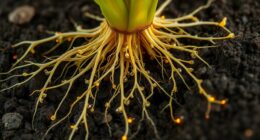To successfully grow eggplant in your greenhouse, choose compact or determinate varieties suited for confined spaces, and manage temperatures between 70-85°F during the day. Provide ample light, supplement with grow lights if needed, and guarantee proper ventilation for airflow and disease control. Fertilize with slow-release nutrients at planting, then liquid feeds rich in potassium and phosphorus every two weeks. Keep the soil moist but not waterlogged, using mulch to maintain moisture. For detailed tips, continue exploring how to optimize your greenhouse eggplant cultivation.
Key Takeaways
- Select compact or determinate eggplant varieties suited for greenhouse cultivation.
- Maintain optimal temperatures of 70-85°F during the day and above 55°F at night.
- Provide 12-16 hours of light daily, supplementing with grow lights if necessary.
- Use slow-release fertilizer at planting and liquid fertilizer rich in potassium and phosphorus every two weeks.
- Ensure consistent watering, keep soil moist but not waterlogged, and use mulch to retain moisture.

Growing eggplants in a greenhouse offers a controlled environment that can extend your growing season and improve yields. When you cultivate eggplants indoors, you gain the ability to regulate temperature, humidity, and light, creating ideal conditions for healthy plants. This means you can start your seedlings earlier in the season and harvest longer into the fall, giving you more flexibility and a higher chance of success. To make the most of your greenhouse setup, guarantee you select the right eggplant varieties suited for greenhouse growth. Compact or determinate types often perform better in confined spaces, while larger indeterminate varieties require more room and support.
Lighting plays a essential role in healthy eggplant development. Since natural sunlight can be limited in a greenhouse, supplement with grow lights if needed. Aim for at least 12 to 16 hours of light daily, especially during shorter winter days. Proper lighting encourages vigorous growth, flowering, and fruit production. Temperature control is equally important; keep daytime temperatures between 70-85°F and nighttime temperatures above 55°F. Fluctuations outside this range can stunt growth or cause stress, so consider using fans, heaters, or shade cloths to maintain stable conditions. Adequate ventilation helps prevent disease and promotes healthy airflow around your plants. Additionally, understanding the contrast ratio of your grow lights can help optimize light quality for your eggplants.
Fertilization is essential for producing high-quality eggplants. Start with a balanced, slow-release fertilizer when planting seedlings to promote steady growth. As your plants develop, switch to a liquid fertilizer rich in potassium and phosphorus to support flowering and fruiting. Eggplants are heavy feeders, so don’t hesitate to fertilize regularly—about every two weeks—according to the product’s instructions. Be cautious not to over-fertilize, as this can lead to excessive foliage growth at the expense of fruit production. Keep an eye on the plants’ response; healthy, vibrant leaves and abundant flowering indicate proper nutrition.
Watering should be consistent and thorough, ensuring the soil stays evenly moist but not waterlogged. Overwatering can lead to root rot, while underwatering stresses the plants and reduces yields. Use mulch to retain soil moisture and moderate temperature fluctuations around the roots. Regular monitoring for pests and diseases is essential; greenhouse environments can promote rapid spread if issues are left unchecked. Remove affected leaves promptly and consider organic pest control methods.
Frequently Asked Questions
What Are the Best Companion Plants for Greenhouse Eggplant?
You’re curious about the best companion plants for greenhouse eggplant. To boost growth and protect your eggplants, plant marigolds nearby—they deter pests like nematodes and aphids. Basil also helps improve flavor and repels insects. Nasturtiums attract beneficial insects and can trap pests. These companions create a healthier environment, boost yields, and reduce the need for chemical treatments, making your greenhouse more productive and sustainable.
How Do I Prevent Pests on Greenhouse Eggplants?
To prevent pests on your greenhouse eggplants, start by maintaining a clean environment and inspecting plants regularly. Use beneficial insects like ladybugs or predatory mites to naturally control pests. You can also apply neem oil or insecticidal soap as a safe, effective treatment. Keep your plants healthy with proper watering and fertilization, as strong plants resist pests better. Remember, early detection and intervention are key to keeping pests at bay.
What Are Signs of Nutrient Deficiencies in Eggplants?
You’ll notice nutrient deficiencies in your eggplants through various signs. If leaves turn yellow and lose their veins’ color, it’s likely nitrogen deficiency. Pale or purple-tinged foliage may indicate phosphorus shortage. Weak stems and poor fruit development point to potassium deficiency. Keep an eye out for stunted growth or malformed fruit, which can signal calcium or magnesium issues. Regular soil testing helps you identify and address these deficiencies early.
How Often Should I Prune Greenhouse Eggplants?
Think of pruning as sculpting a masterpiece—you want to reveal the plant’s best features. For greenhouse eggplants, you should prune every 2 to 3 weeks, removing suckers and any dead or diseased leaves. Regular pruning encourages better airflow, stronger growth, and higher yields. Keep an eye on your plants, and if they start to look overcrowded or spindly, prune sooner to maintain health and productivity.
Can Eggplants Be Grown Year-Round in a Greenhouse?
You can grow eggplants year-round in a greenhouse if you provide the right conditions. Keep the temperature consistent between 70-85°F, guarantee plenty of sunlight, and maintain high humidity. Use supplemental lighting during shorter days and monitor for pests and diseases regularly. With proper care, your greenhouse creates an ideal environment, allowing you to enjoy fresh eggplants throughout the year, regardless of outdoor weather conditions.
Conclusion
Growing eggplants in a greenhouse is rewarding, even if you’re worried about complexity. With proper fertilization and care, you’ll see healthy plants produce delicious fruit. Don’t let the initial effort deter you—once you understand the process, it becomes easier and more enjoyable. Just stay consistent with your watering and fertilizing schedule, and you’ll enjoy a bountiful harvest. Trust me, the effort is worth it for the fresh, flavorful eggplants you’ll be proud to harvest.









